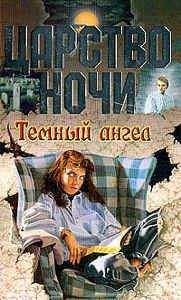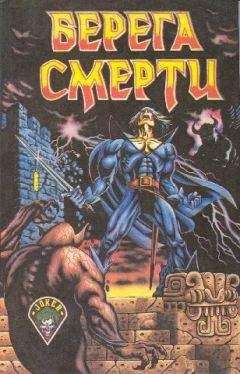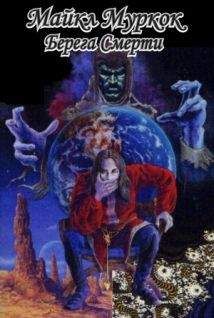Майкл Муркок - Английский язык с М. Муркоком
encounter [ɪnˈkauntə] library [ˈlaɪbrərɪ] causeway [ˈkɔ:zweɪ] perturbed [pəˈtə: bd]
And Corum made no decision for a month. After the horror of his encounters with the Mabden raiders, his brain needed time to heal and this was difficult with the constant reminder of his injuries every time he automatically tried to use his left hand or glimpsed his reflection.
When not with him, Rhalina spent much of her time in the castle's library, but Corum had no taste for reading. He would walk about the battlements of the castle or take a horse and ride over the causeway at low tide (though Rhalina was perturbed by this for fear that he would fall prey to one of the Pony Tribes which occasionally ranged the area) and ride for a while among the trees.
And though the darkness in his mind became less noticeable as the pleasant days passed, it still remained (и хотя тьма в его душе стала менее заметной, когда отрадные дни проходили, она по-прежнему оставалась). And Corum would sometimes pause in the middle of some action (и Корум иногда замирал в середине = во время какого-нибудь действия) or stop when he witnessed some scene that reminded him of his home, the Castle Erorn (или останавливался, когда видел какую-нибудь картину /на гобелене/, которая напоминала ему о его доме, замке Эрорн).
The Margravine's castle was called simply Moidel's Castle (замок маркграфини назывался просто замок Мойдела) and was raised on an island called Moidel's Mount (и был возведен на острове под названием Гора Мойдел), after the name of the family that had occupied it for centuries (по имени семейства, которое жило на нем веками). It was full of interesting things (замок был полон интересных вещей). There were cabinets of porcelain and ivory figurines (там были залы фарфоровых изделий и статуэток из слоновой кости; cabinet — кабинет; шкаф с выдвижными ящиками; выставочное помещение), rooms filled with curiosities taken at different times from the sea (помещения, заполненные диковинками, собранными в разные времена в море; curiosity — любознательность, любопытство; диковина, редкость), chambers in which arms and armour were displayed (комнаты, в которых оружие и доспехи были выставлены), paintings (crude by Corum's standards) (картины, грубые по меркам Корума) depicting scenes from the history of Lywm-an-Esh (изображавшие сцены из истории Лиум-ан-Эш), as well as scenes taken from the legends and folktales of that land, which was rich in them (а также сцены, взятые из легенд и народных сказок этой страны, которая была богата ими; to be rich — изобиловать, кишеть). Such strange imaginings were rare among the Vadhagh (столь незнакомые грезы = причудливые фантазии были редки среди вадагов), who had been a rational people, and they fascinated Corum (которые были рациональными людьми, и они /фантазии/ заворожили Корума).
noticeable [ˈnəutɪsəbl] porcelain [ˈpɔ:s (ə) lɪn] ivory [ˈaɪv (ə) rɪ] figurine [, fɪɡjuˈri:n] curiosity [, kju (ə) rɪˈɔsɪtɪ] rational [ˈræʃ (ə) nəl] fascinated [ˈfæsɪneɪtɪd]
And though the darkness in his mind became less noticeable as the pleasant days passed, it still remained. And Corum would sometimes pause in the middle of some action or stop when he witnessed some scene that reminded him of his home, the Castle Erorn.
The Margravine's castle was called simply Moidel's Castle and was raised on an island called Moidel's Mount, after the name of the family that had occupied it for centuries. It was full of interesting things. There were cabinets of porcelain and ivory figurines, rooms filled with curiosities taken at different times from the sea, chambers in which arms and armour were displayed, paintings (crude by Corum's standards) depicting scenes from the history of Lywm-an-Esh, as well as scenes taken from the legends and folktales of that land, which was rich in them. Such strange imaginings were rare among the Vadhagh, who had been a rational people, and they fascinated Corum.
He came to realise that many of the stories concerning magical lands and weird beasts (он осознал, что многие из преданий, касавшихся волшебных земель и фантастических животных; weird — сверхъестественный, причудливый) were derived from some knowledge of the other planes (основывались на знаниях, /полученных/ из иных плоскостей; to be derived from — извлекаться, происходить из; создаваться на основе /чего-либо/). Obviously the other planes had been glimpsed (очевидно, другие плоскости были увидены кем-то мельком) and the legend-makers had speculated freely from the fragments of knowledge thus gained (а создатели легенд вольно передали фрагменты знаний, таким образом полученных; to speculate — обдумывать, размышлять; to gain — добывать, получать, приобретать). It amused Corum to trace a wild folktale back to its rather more mundane source (Коруму было интересно прослеживать необычные народные сказки обратно к их немного более земному источнику = находить их источник в реальной, земной жизни; to amuse — занимать, забавлять; wild — дикий, буйный; своенравный), particularly where these folktales concerned the Old Races (особенно /в тех местах/, где эти народные сказки касались древних рас) — the Vadhagh and the Nhadragh (вадагов и надрагов) — who were attributed with the most alarming range of supernatural powers (которые наделялись /там/ тревожным рядом = многими пугающими сверхъестественными способностями; to attribute — приписывать /свойство и т. д. /, относить к; range — ряд, группа; область, сфера). He was also, by this study, offered some insight (к нему также, благодаря этому изучению, пришло понимание; to offer — предлагать, преподносить; insight — проницательность, понимание; внезапное озарение) concerning the attitudes of the Mabden of the East (позиции мабденов востока), who seemed to have lived in awe of the Old Races (которые, казалось, жили в священном трепете перед древними расами; awe — благоговейный страх, трепет) before they had discovered that they were mortal and could be slain easily (до тех пор, пока они не обнаружили, что те — смертны и могут быть легко убиты). It seemed to Corum that the vicious genocide engaged upon by these Mabden (Коруму показалось, что жестокий геноцид, учиненный этими мабденами; vicious — порочный, дурной; ужасный; to engage — подвергать/ся/, затрагивать/ся/) was partly caused by their hatred of the Vadhagh for not being the great seers and sorcerers (был частично вызван их ненавистью к тому /факту/, что вадаги — не великие ясновидцы и колдуны) the Mabden had originally thought them to be (/как/ мабдены первоначально считали /их/).
weird [wɪəd] mundane [ˈmʌndeɪn] awe [ɔ:] vicious [ˈvɪʃəs] genocide [ˈʤenəusaɪd]
He came to realise that many of the stories concerning magical lands and weird beasts were derived from some knowledge of the other planes. Obviously the other planes had been glimpsed and the legend-makers had speculated freely from the fragments of knowledge thus gained. It amused Corum to trace a wild folktale back to its rather more mundane source, particularly where these folktales concerned the Old Races — the Vadhagh and the Nhadragh — who were attributed with the most alarming range of supernatural powers. He was also, by this study, offered some insight concerning the attitudes of the Mabden of the East, who seemed to have lived in awe of the Old Races before they had discovered that they were mortal and could be slain easily. It seemed to Corum that the vicious genocide engaged upon by these Mabden was partly caused by their hatred of the Vadhagh for not being the great seers and sorcerers the Mabden had originally thought them to be.
But this line of thought brought back the memories and the sorrow and the hatred (но это направление мысли = подобные размышления вновь пробуждали воспоминания, печаль и ненависть; line — линия, черта; направление, образ действия; to bring back — возвращать; воскрешать в памяти) and Corum would become depressed, sometimes for days (и Корум становился подавленным, иногда на несколько дней), and even Rhalina's love could not console him then (и даже любовь Ралины не могла утешить его тогда).
But then one day he inspected a tapestry in a room he had not previously visited (но потом однажды он рассматривал гобелен в комнате, /которую/ прежде /никогда/ не посещал) and it absorbed his attention as he looked at the pictures and studied the embroidered text (и тот поглотил его внимание, когда Корум посмотрел на /изображенные/ картины и изучил вышитый текст).
This was a complete legend telling of the adventures of Mag-an-Mag, a popular folk hero (это был полный /текст/ легенды, рассказывавшей о приключениях Маг-ан-Мага, популярного народного героя). Mag-an-Mag had been returning from a magical land when his boat had been set upon by pirates (Маг-ан-Маг возвращался из какой-то волшебной страны, когда на его судно напали пираты; boat — лодка, шлюпка; корабль, судно). These pirates had cut off Mag-an-Mag's arms and legs and thrown him overboard (эти пираты отрубили Маг-ан-Магу руки и ноги и выбросили его за борт; to throw), then they had cut off the head of his companion, Jhakor-Neelus (потом они отрубили голову его спутнику, Джакор-Нилусу), and tossed his body after that of his master, but kept the head, apparently to eat (и швырнули его тело вслед за телом его господина, но сохранили голову, видимо, чтобы съесть; to toss — бросать, кидать; швырять). Eventually Mag-an-Mag's limbless body had been washed up on the shore of a mysterious island (в конце концов лишенное конечностей тело Маг-ан-Мага было выброшено на берег какого-то таинственного острова; to wash up — прибивать к берегу, выбрасывать на берег) and Jhakor-Neelus's headless body had arrived at a spot a little further up the beach (а безголовое тело Джакор-Нилуса прибыло на место чуть выше по берегу; beach — /морской/ берег; пляж).



